Last Updated on January 10, 2026 by Ioana
I was born and raised in Romania, and I moved back here in 2024 after living in NYC for almost 14 years. I am from Oradea and I visited the Transylvania region many times in my life. If you visit Romania you must spend a few days in Transylvania since it’s home to so many incredible attractions. In this blog post I will share how to spend 4 days in Transylvania to help you plan your trip. This post contains affiliate links. When you make a purchase I may get a small commission at no extra cost to you. Find out more here.
Planning your next trip? Check out these helpful resources:
Day 1: Brasov and bear watching
All towns on this Transylvania itinerary are Saxon towns. They were built by people of German descent who came to Transylvania to grow the economy of the place.
Brasov is one of the most famous cities in Transylvania, right in the heart of Romania. It’s the closest one to Bucharest, so I think Brasov should be your first stop.
✈️ Heading to Romania soon? Check out these guides:
- Where to stay in Brasov: the best hotel guide
- Where to stay in Sighisoara: the best hotels
- The best area to stay in Bucharest
- Bear watching in Transylvania: all you need to know
- Romania in 5 days: a native’s ultimate itinerary
- The best Romania one week itinerary from a local
- The best Oradea 3 day itinerary: a native’s top picks
The Black Church
The Black Church is located in the center of Brasov and it is the main gothic church in Romania. It is a Lutheran church that is still operating, but it can also be visited by tourists.
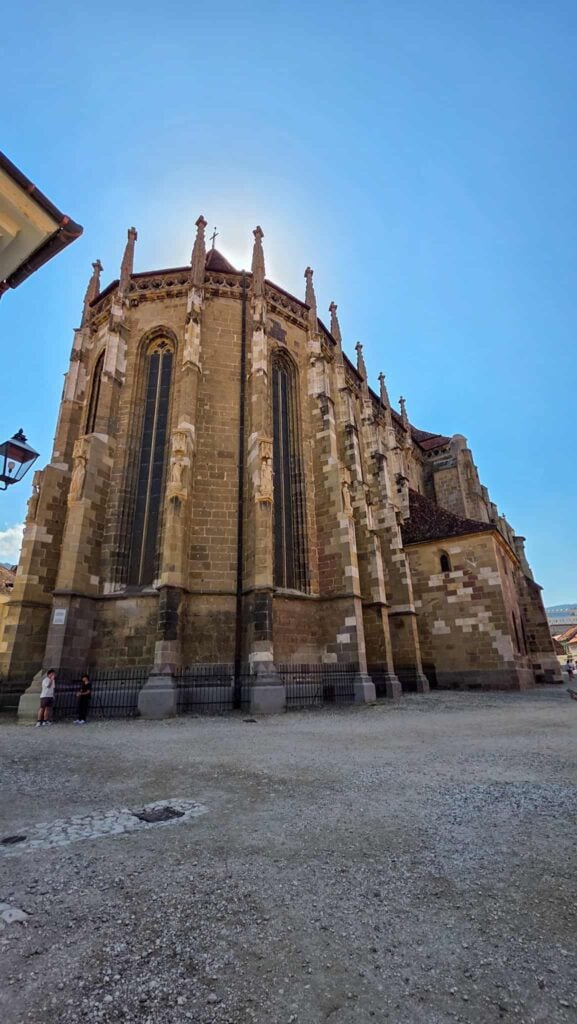
The church received its name after the 1689 fire, which turned the exterior of the building black from all the smoke.
It has a collection of over 100 Transylvanian rugs, all hung throughout the church. It is the second largest collection of rugs after the one in Topkapi Palace in Istanbul.
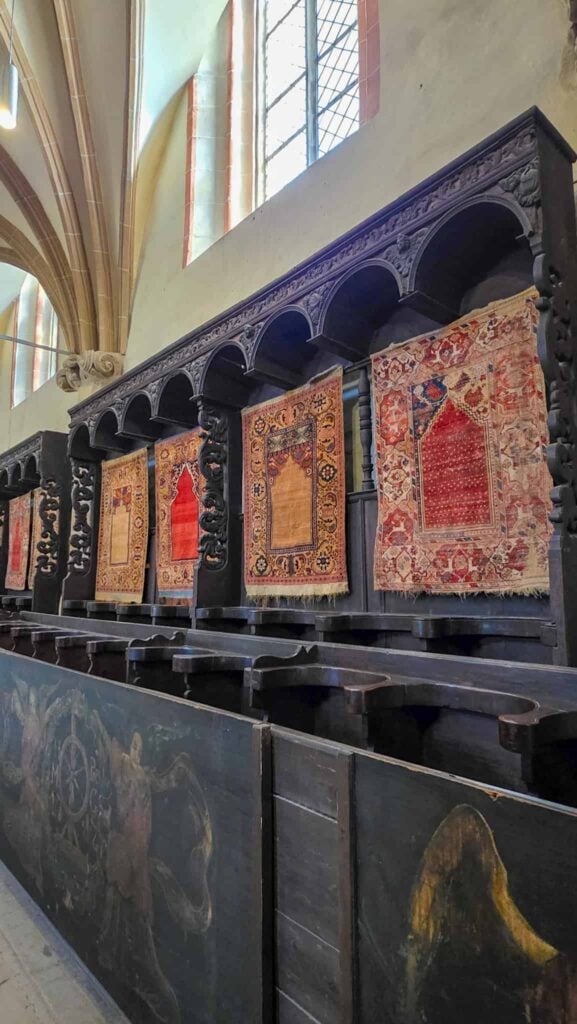
Another cool thing about this church is that is still has the marks from the bullets that were fired during the 1989 Romanian Revolution that marked the end of communism for the country.
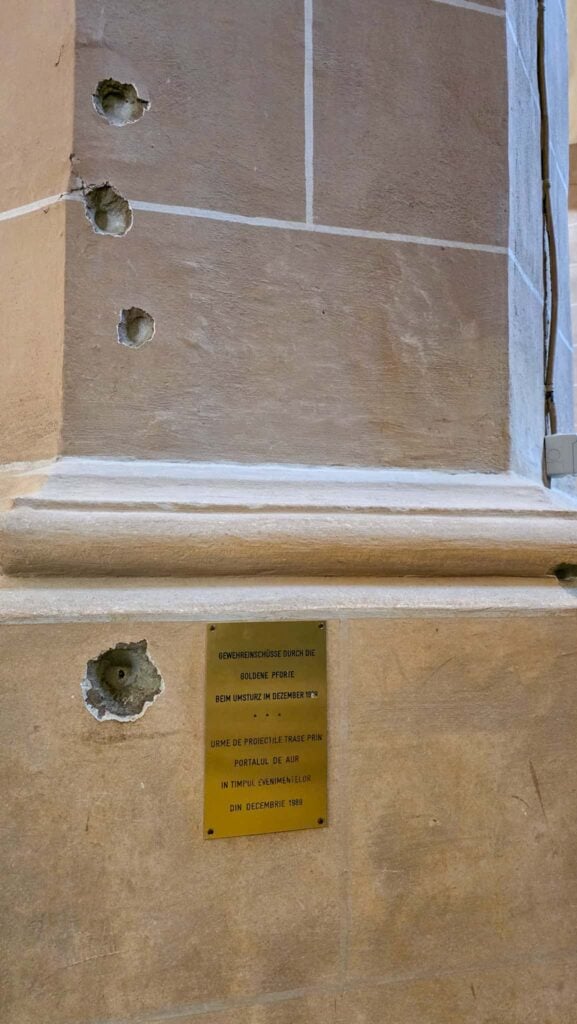
It’s a place with a lot of history, so I highly encourage you to visit it.
Council Square
The next stop is the gorgeous Council Square (or Piata Sfatului in Romanian), the main square of Brasov. It’s right by the Black Church.
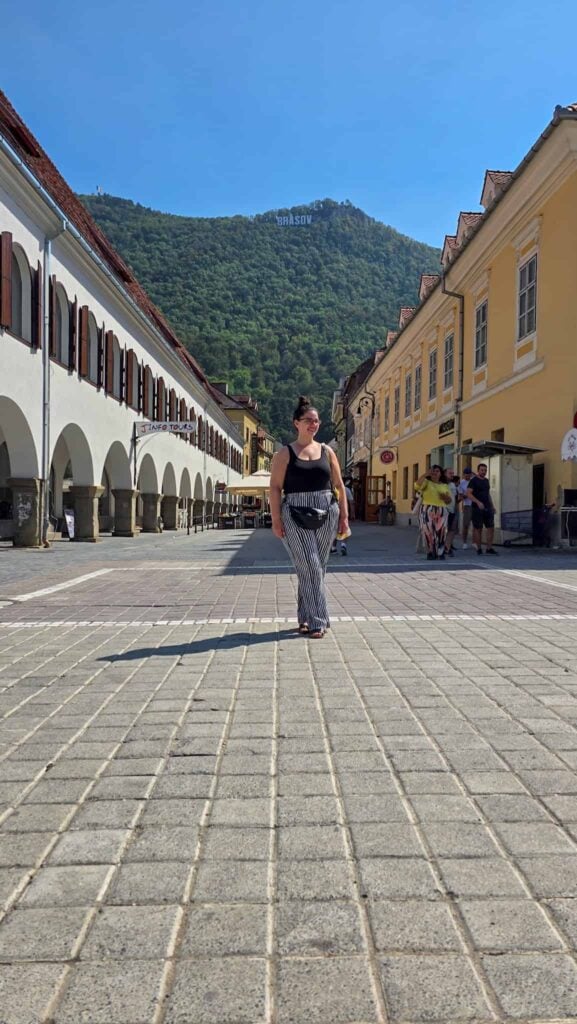
Here you can see the Old City Hall, plenty of cute colorful buildings, and a fountain. There are also many restaurants and cafes here where you can have some food or a drink.
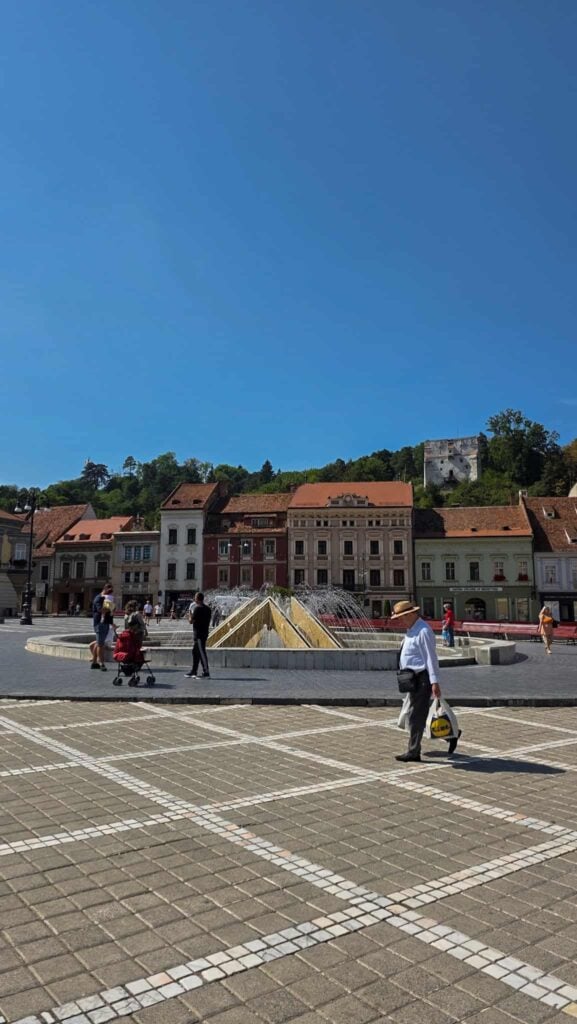
If you want to eat in this area I recommend you go to Ograda. I ate there recently and the food was great. It’s the perfect place for lunch with a view since they have outdoor seating in the square as well.
Rope Street
Rope Street is the narrowest street in Brasov and one of the narrowest streets in Europe. The walls of the buildings that mark the two sides of the street are all covered in colorful graffiti, which makes for a great photo op.
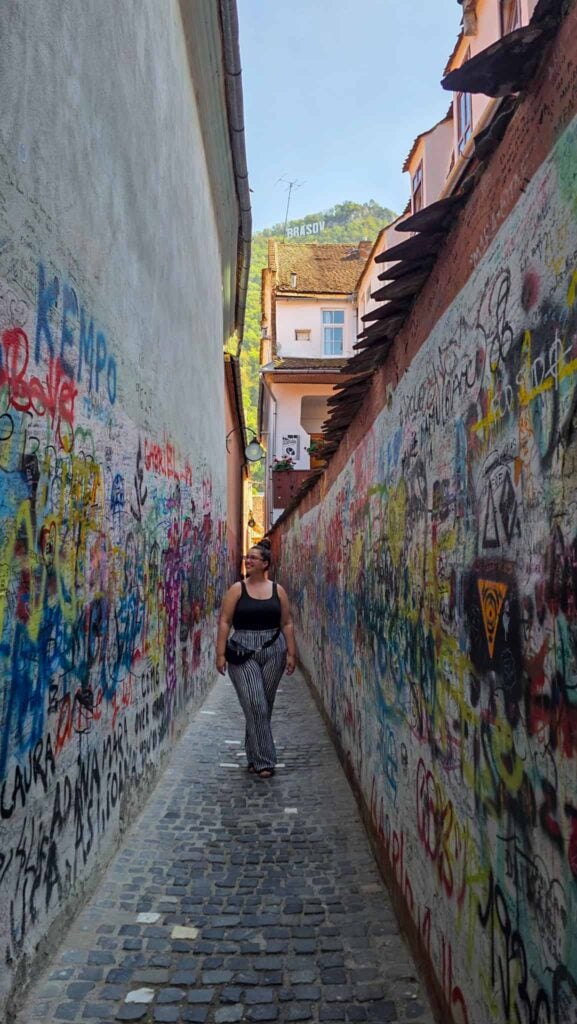
At the same time, if you walk towards the middle of the street you’ll also be able to see the Brasov sign on the Tampa Mountain, so you can also take a picture that has the Brasov sign in the background.
Black Tower
The Black Tower is one of the 4 towers of Brasov. It was built on a hill and it was used as an observation tower to protect the city from enemies. You can also climb to the top of the tower if you visit.
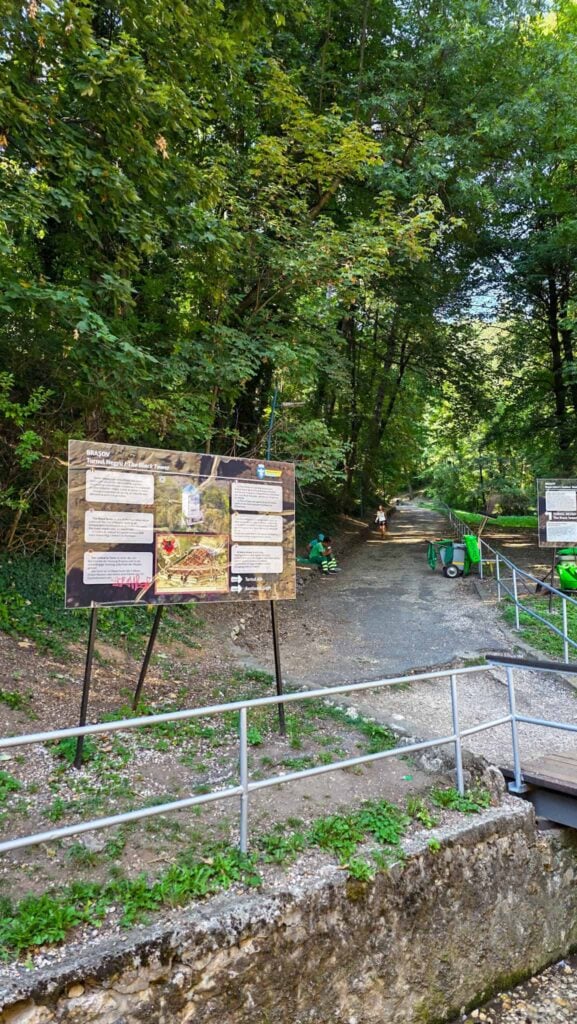
White Tower
After you visit the White Tower you can take a stroll on Dupa Ziduri Street by the Graft river. It’s a very picturesque little street that connects Brasov’s medieval fortified towers.
And you’ll end to the White Tower, another defense tower in Brasov. It got its name because it was painted with white paint.
Catherine’s Gate
Also in this tower area you will find Catherine’s Gate, the only original gate that survived from medieval times. It is named after St. Catherine’s Monastery that was located there back in the day.
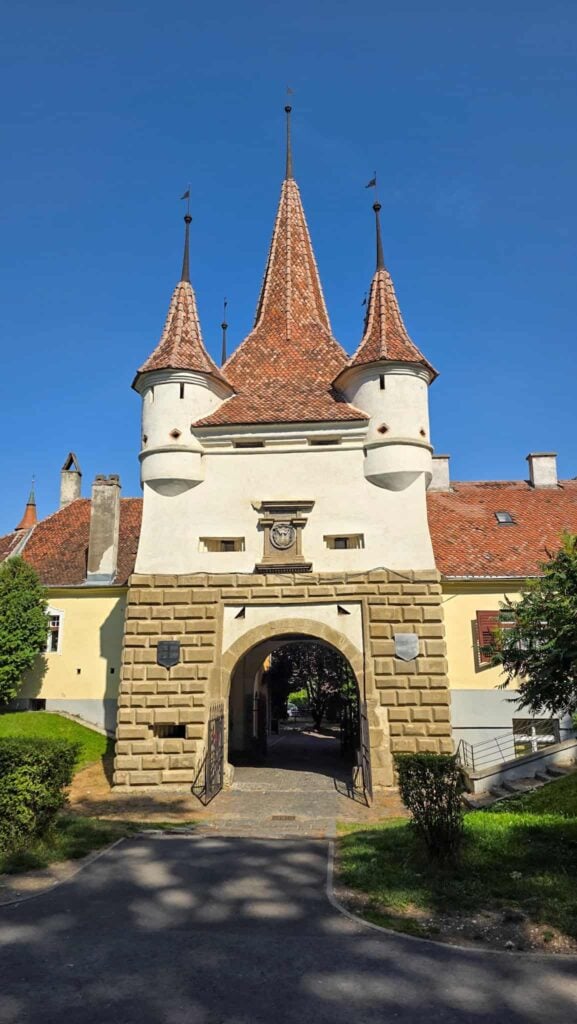
Lunch at La Ceaun
Brasov has many great restaurants where you can sample Romanian local cuisine. One of them is La Ceaun, in the old town. They have seating both indoors and outdoors.
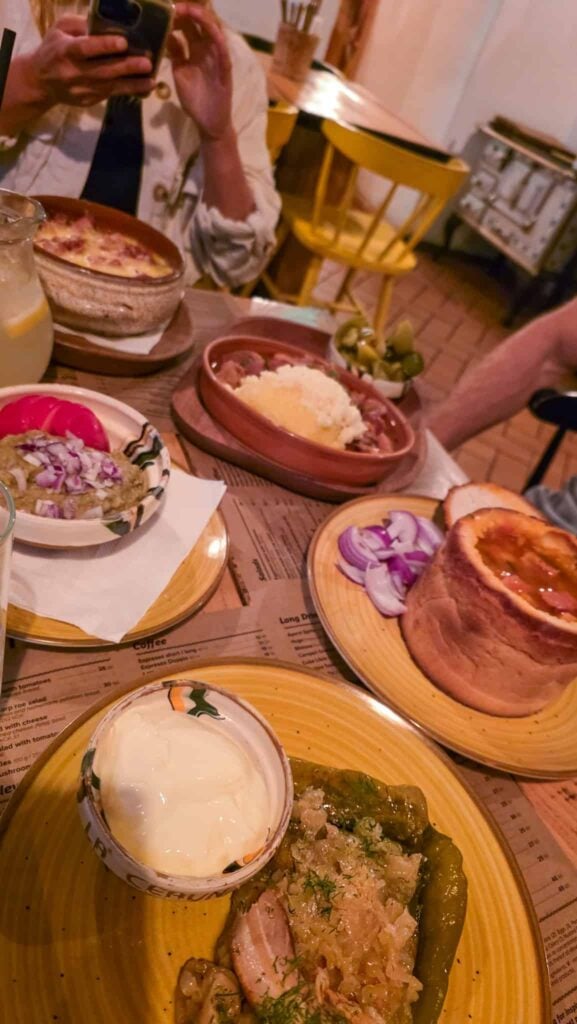
Even though it’s a very popular restaurant, they will squeeze in without a reservation. The food is incredible. You can try sarmale, eggplant spread, bean soup in a bread bowl, and many other traditional dishes.
For drinks you can try palinca, the local plum brandy. It’s very strong, about 50% alcohol, but it’s a must when you visit Romania.
For non-alcoholic drinks I recommend socata. It’s an elderflower lemonade and it tastes exactly like the one my grandma used to make for me when I was a kid.
Bear Watching
Bear watching is one of the coolest activities you can do in Transylvania. It’s totally safe as you will be indoors in a bear observatory. The observatory has large windows so you can see the bears and take lots of pictures and videos.
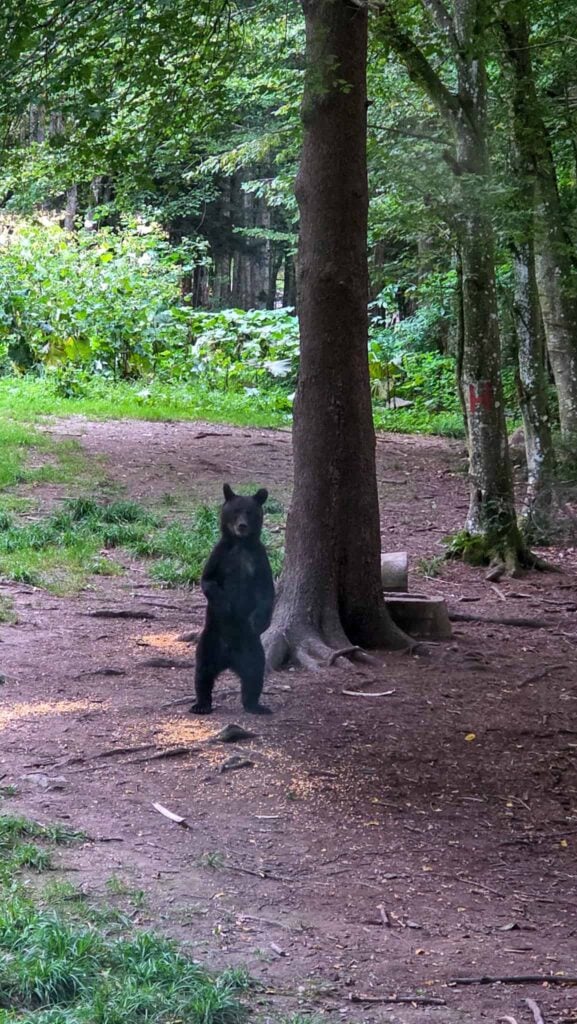
On this guided tour you will be picked up from Brasov in the late afternoon and then the guide will drive you to the forest in the Carpathian Mountains. From there a ranger will escort you on a short walk to the hideaway.
The ranger is armed and also has bear spray on him in case bears come close. But since they do this every day and bears are used to the ranger, they don’t come close.
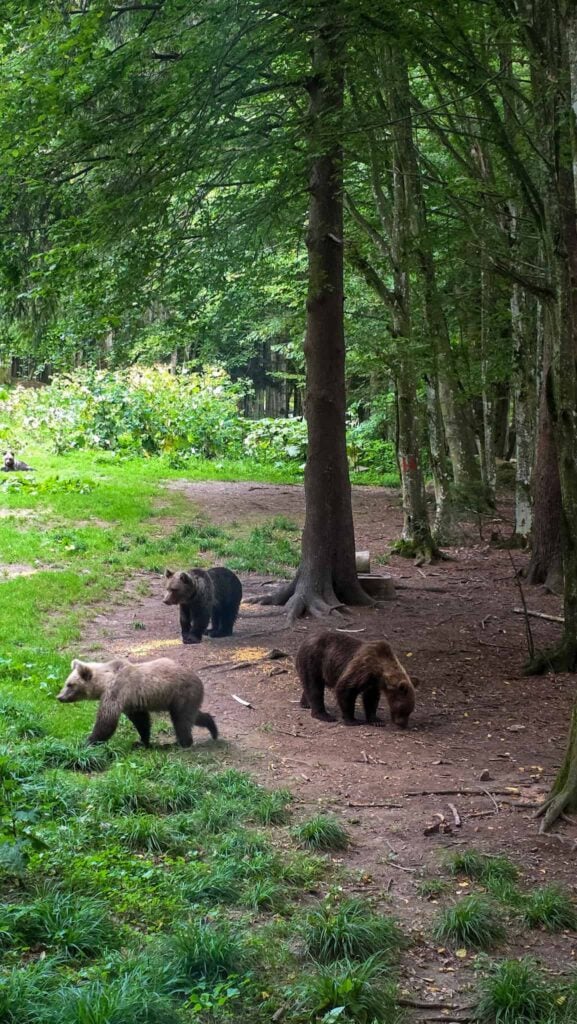
Then you spend about 2 hours in the hideaway marveling of these cute puppies of the forest. I thought only 1 or 2 bears would show up, but I think we saw over 10 of them.
We spotted both cubs and adult bears. Watching them scratch their backs by the trees or lifting themselves up on logs was adorable. One of the coolest things I’ve ever done!
Day 2: Dracula’s Castle and Peles Castle
Dracula’s Castle
The legendary Bran Castle is popular because of Bram Stoker. In his novel about the fictional character Dracula, he describes a medieval castle that looks exactly like the Bran Castle. This castle in Romania was his inspiration for his novel.
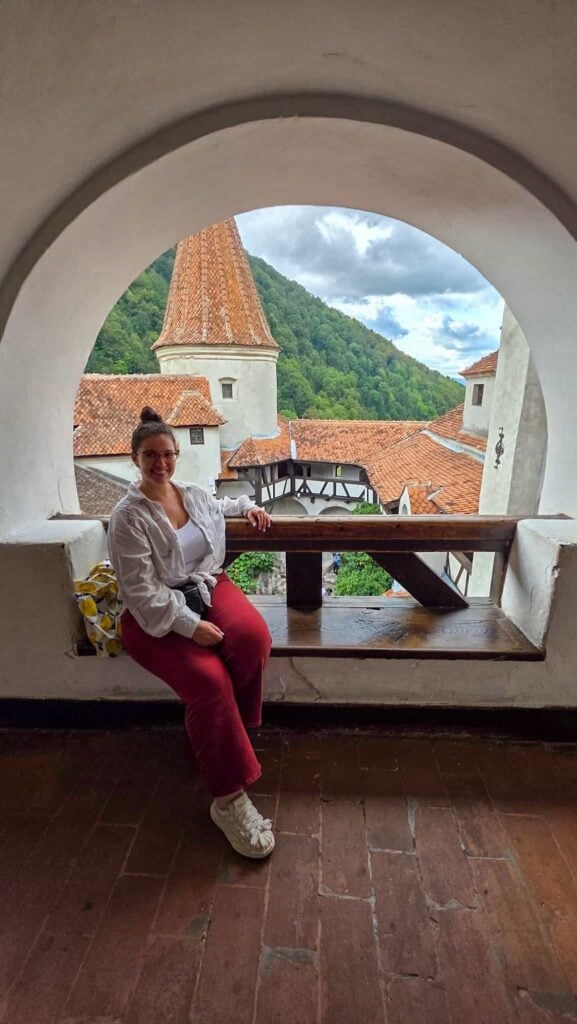
Since Dracula is well-known all over the world, a lot of tourists come to visit the castle. The castle has no connection with the real Dracula, Vlad the Impaler. He never lived there.
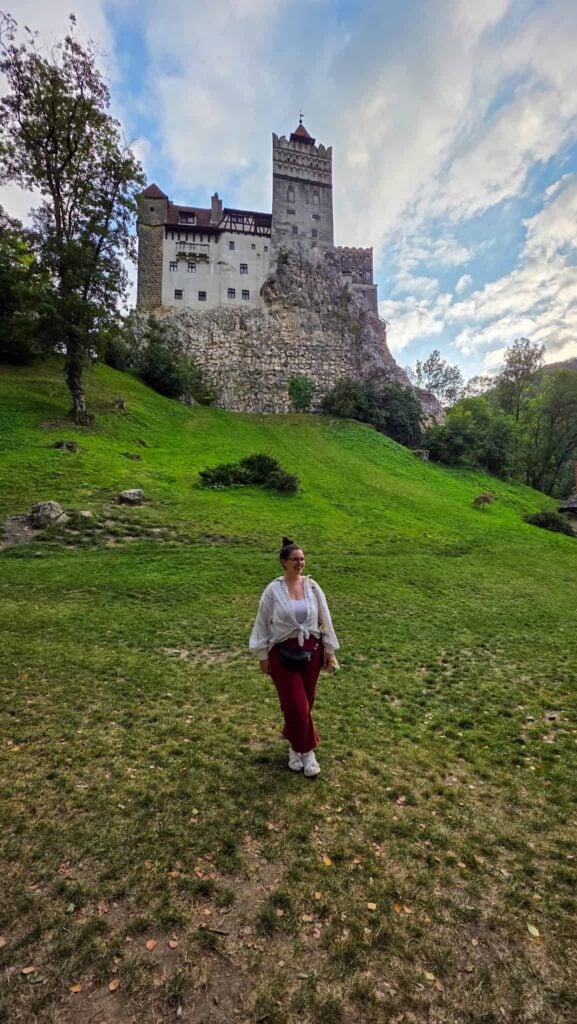
But it’s a really incredible castle and I recommend you visit it.
Eat at Sergiana in Brasov
After you visit the Bran Castle, you can return to Brasov for lunch since the drive is only about an hour.
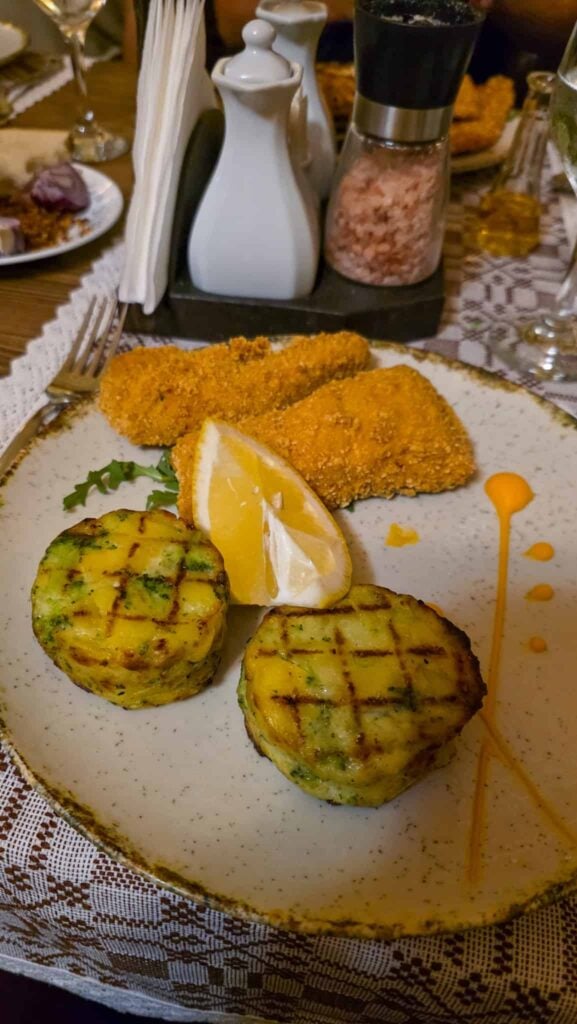
Another great restaurant in Brasov I highly recommend is Sergiana, right at the entrance to the old town. They have an extensive Romanian cuisine menu and the food is really good.
Peleș Castle
After lunch you can head to Peles Castle. The drive is also about an hour from Brasov, but in the opposite direction as Bran. That’s why I suggested you come back to Brasov for lunch.
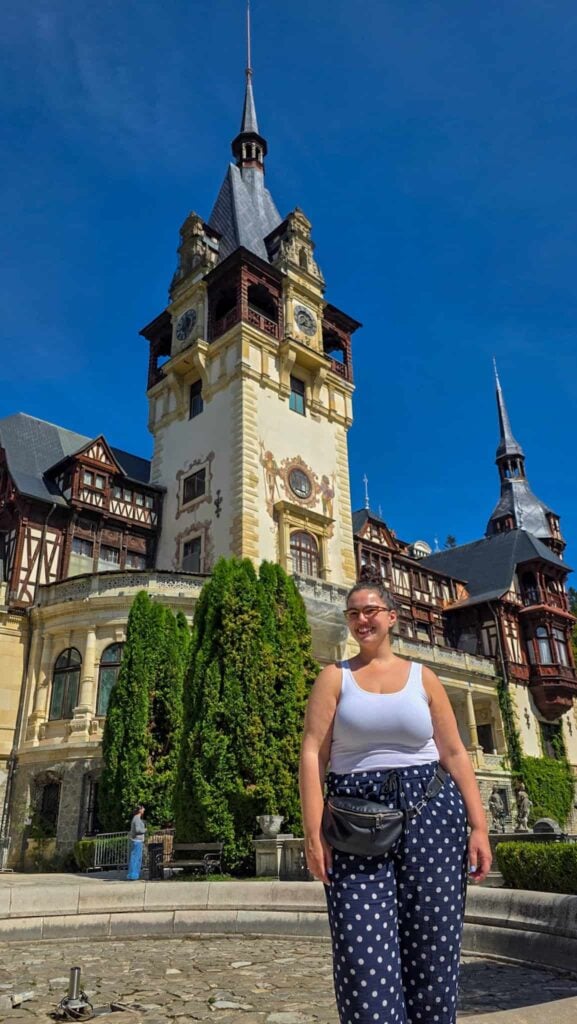
Peles is my favorite castle in Romania. It was built at the beginning of the 1900’s for King Carol I in a Neo-Renaissance style.
He also commissioned Pelișor Castle, translated as “little Peles” for his nephew, the future King Ferdinand.
In 2006 both castles became museums and tourist attractions.
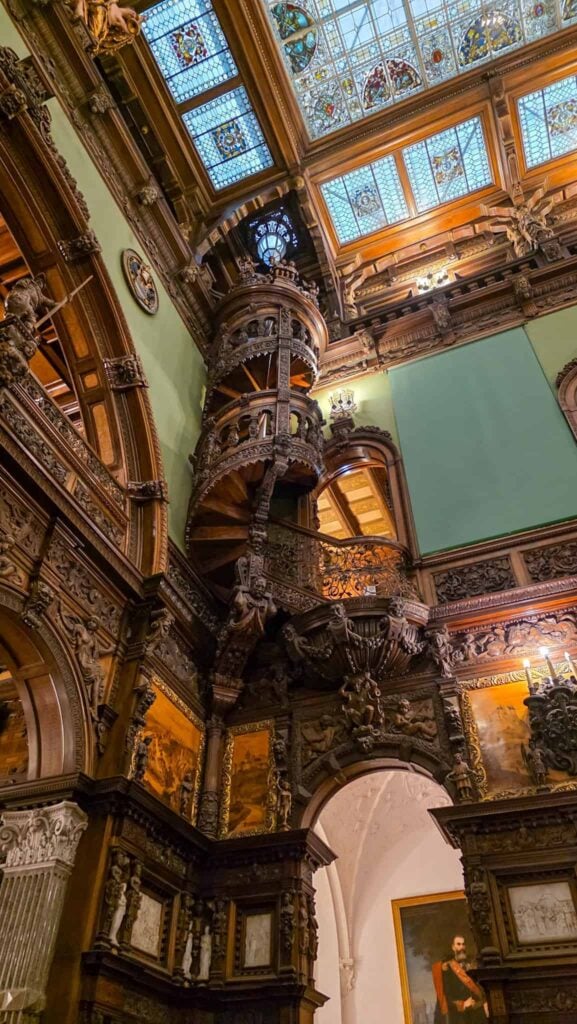
The construction of this castle was a huge project. There were 14 languages spoken on the construction site to make sure that only the best workers were building the castle.
It was also a very expensive project. It cost the equivalent of 120 millions USD today.
But for good reason. It truly is an architectural gem that you must visit at least once in your lifetime. Every single detail in that palace is incredible. And it’s location in the Carpathian Mountains makes you feel like you’re in a Hallmark movie.
✈️ Heading to Romania soon? Check out these guides:
- Where to stay in Brasov: the best hotel guide
- Where to stay in Sighisoara: the best hotels
- The best area to stay in Bucharest
- Bear watching in Transylvania: all you need to know
- Romania in 5 days: a native’s ultimate itinerary
- The best Romania one week itinerary from a local
- The best Oradea 3 day itinerary: a native’s top picks
Day 3: Viscri and Rupea
King Charles’ House in Viscri village
In case you didn’t know, the UK’s King Charles is directly related to Vlad the Impaler (aka Dracula). Because of his heritage and because he loved the Romanian countryside he bought a property in Viscri, which is now a museum.
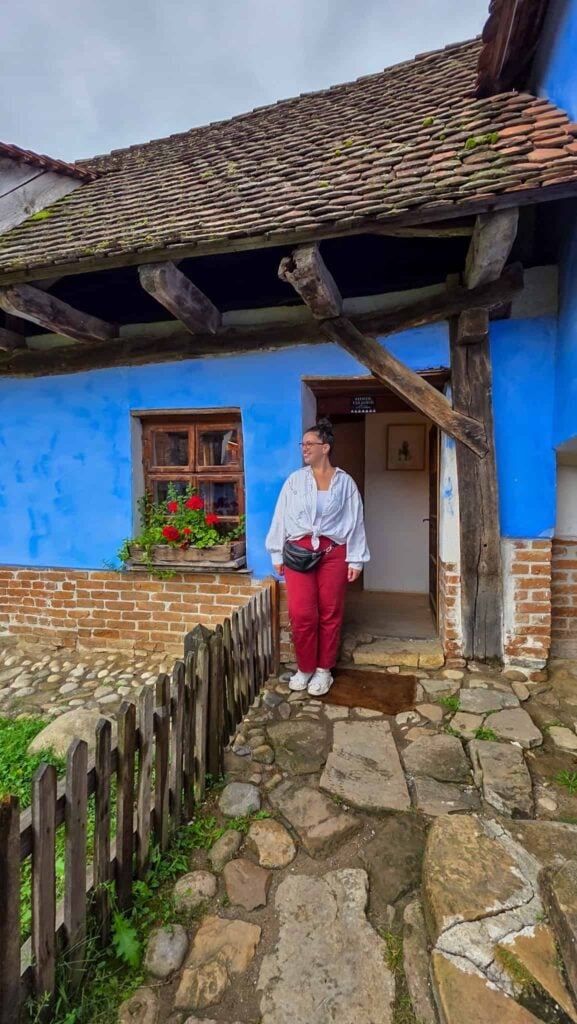
You can visit both the house and the garden. I loved that they had a painting workshop where you could create your own Viscri postcard. They give you the paper, stamps with Viscri designs, pencils, brushes etc.
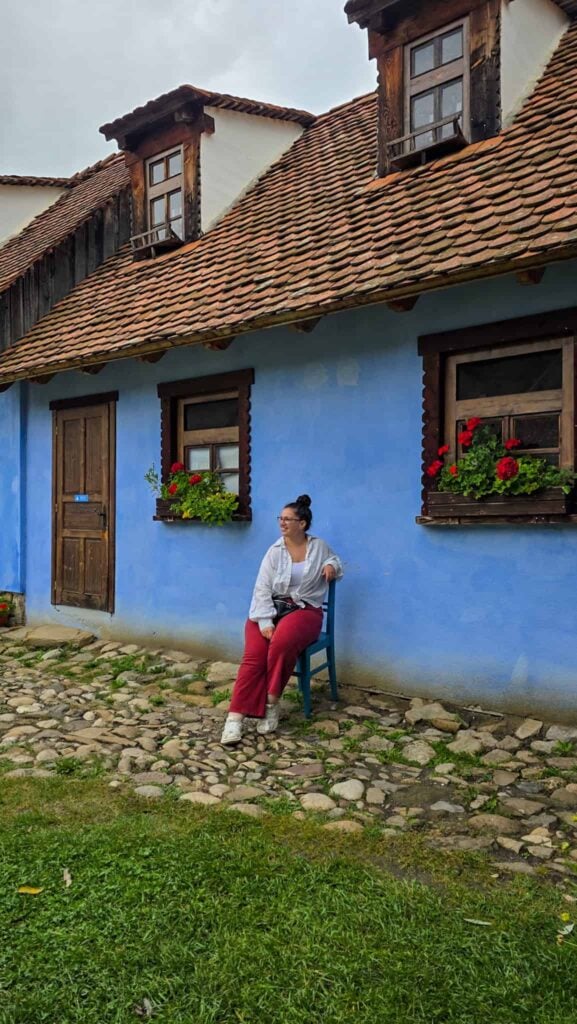
And once you finish your painting you can either take it home with you or leave it at the museum as part of their art collection from visitors.
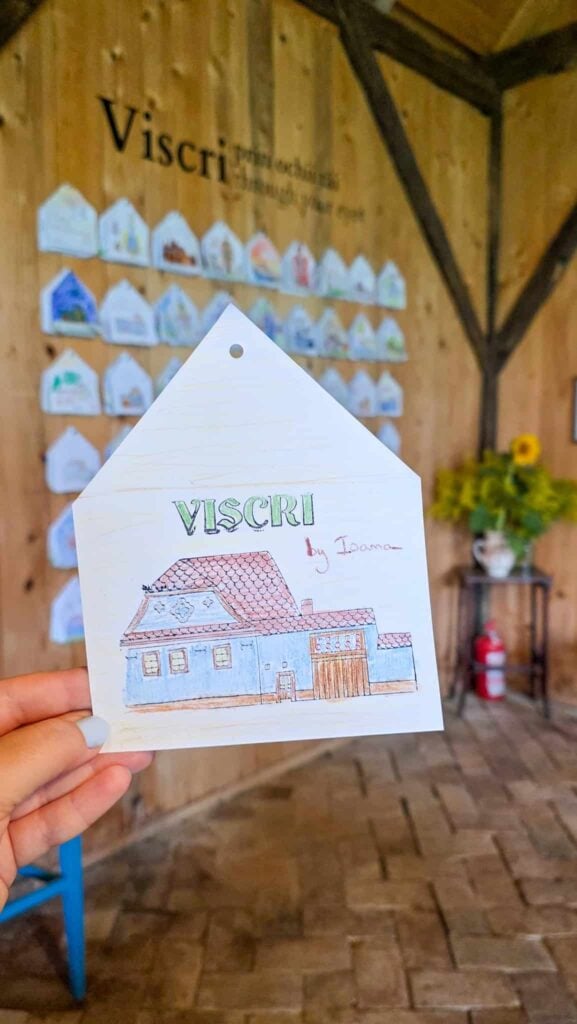
The activity is entirely free and it’s so fun.
Viscri fortified church
The Transylvania region has one of the highest concentrations of fortified churches from the medieval period. Seven villages with fortified churches are UNESCO World Heritage Sites. Viscri is one of them.
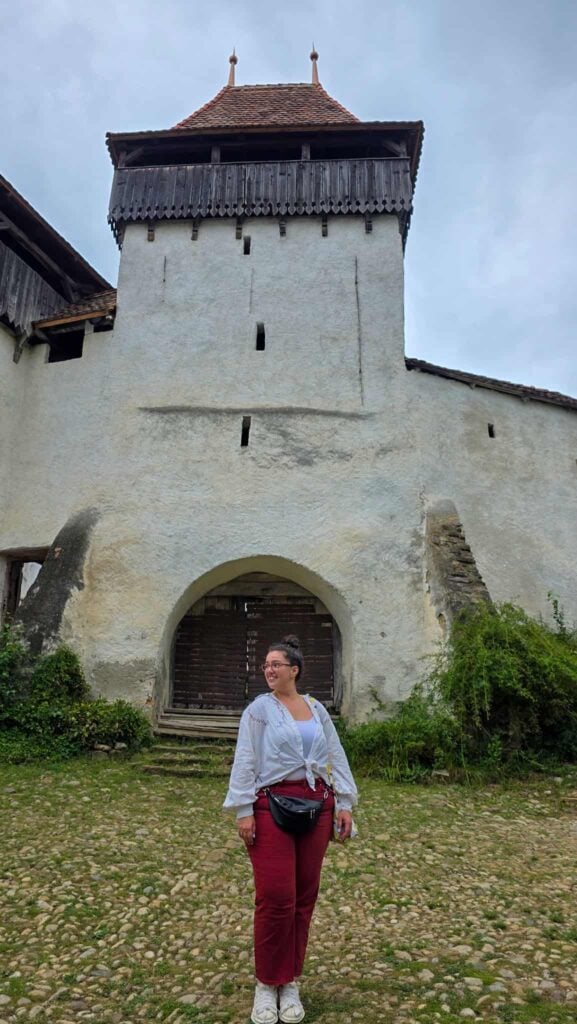
The fortified church in Viscri was built by the Saxons in the 13th century. You can visit the wooden church interior and you can also climb one of the towers for a panoramic view of the village.
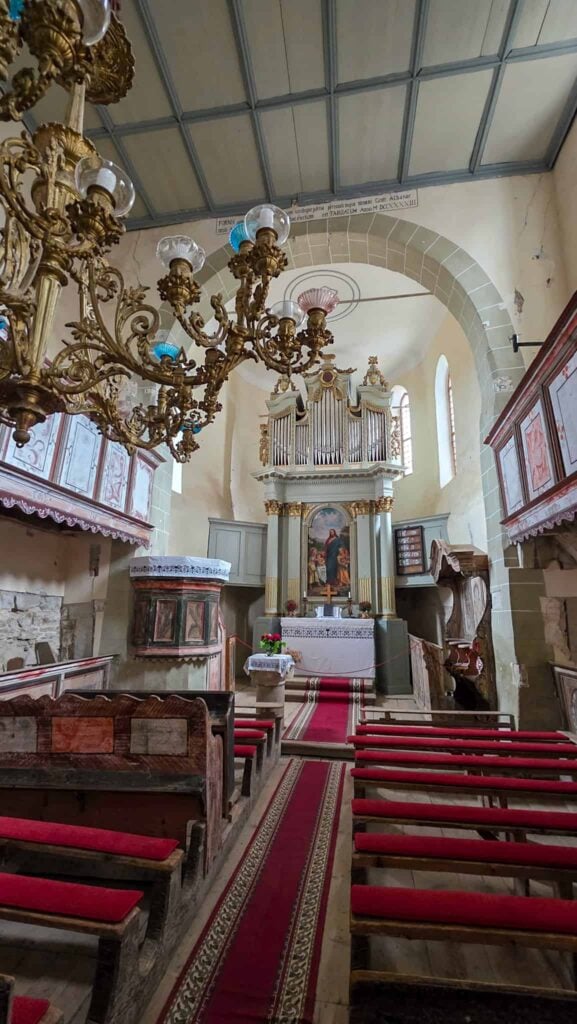
These fortified churches are a big part of Romanian history, so I highly recommend you visit a few of them.
Lunch at Viscri 32
There are multiple good restaurants in Viscri, but I ate at Viscri 32. The food was really good, it came out fast, and I liked how much effort they put into plating it. It not only tasted good, but it looked good too.
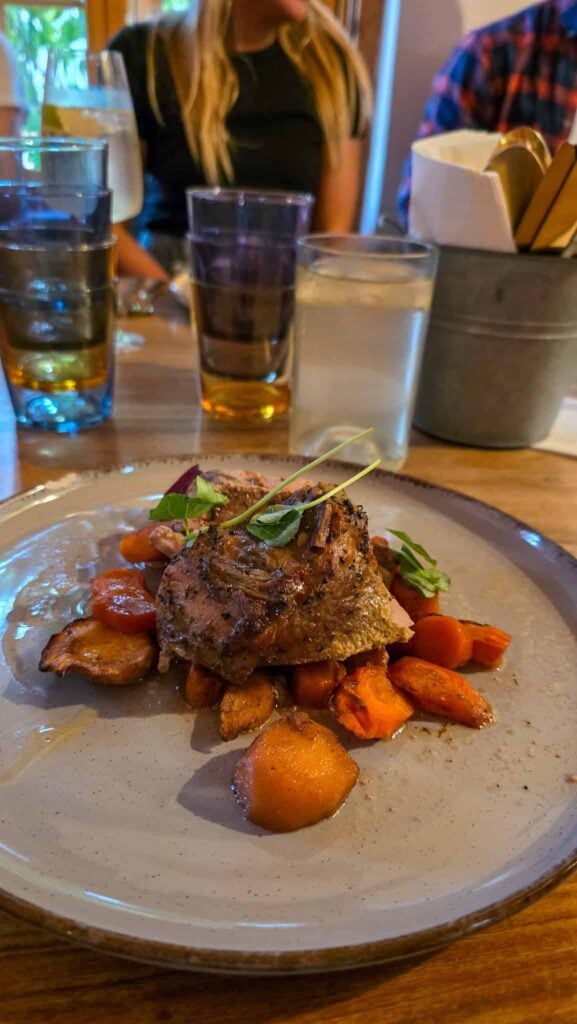
I recommend the porc in bere (it translates as pork in beer). It’s a very tender pork marinated in beer and it is served with root vegetables. So good!
Rupea fortress
Rupea is a village that’s close to Viscri. While its fortress is not on the Unesco list, it’s still a very cool place to visit. You can park right by the entrance, and from there it’s only a short hike to get to the top.
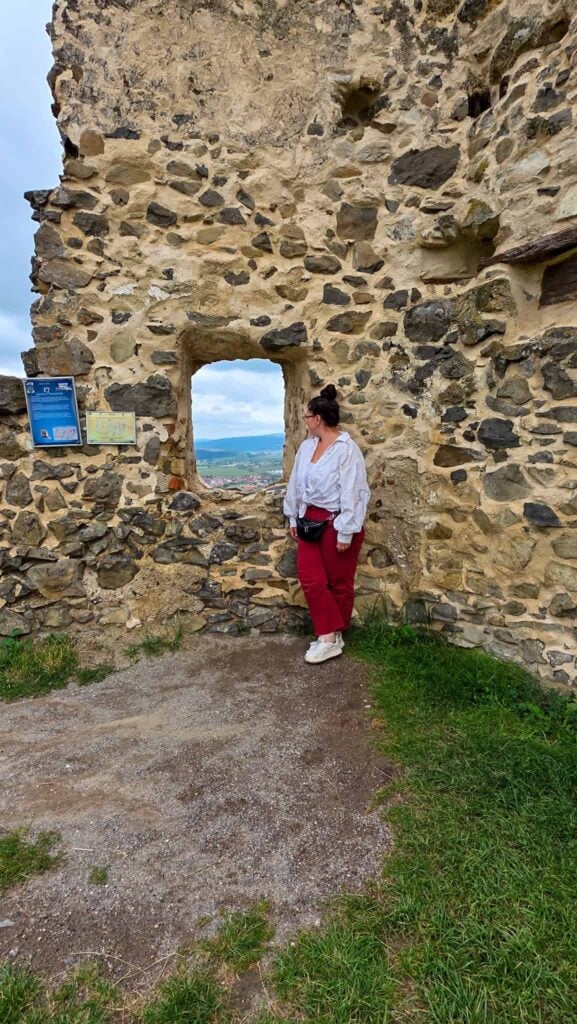
You’ll be able to see the walls and also get an incredible view of the village. It’s the perfect spot for pictures.
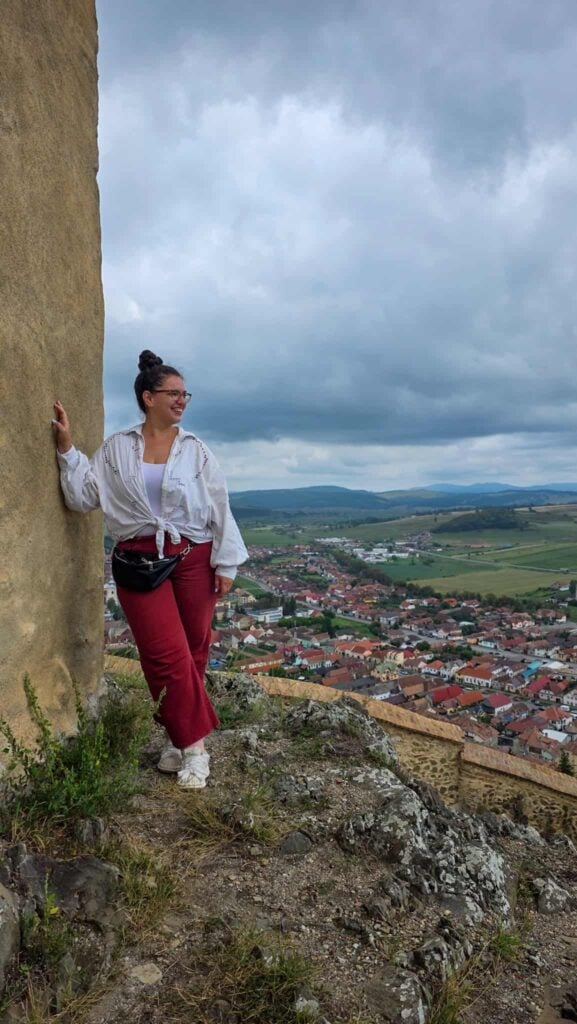
Day 4: Sighisoara
I left Sighisoara for the final day. Sighisoara is a Unesco World Heritage Site and one of the best-preserved medieval towns in the world. It’s a little town that looks like a fairy tale.
It’s my favorite medieval town in the world. So I think you should spend a full day here to properly explore all attractions and to also have enough free time to take everything in and relax at some of the many restaurants and bars in town.
The Clock Tower
The Clock Tower is the main entry point to the Sighisoara citadel. It’s 64 meters high, so you can easily spot it no matter where you are in Sighisoara.
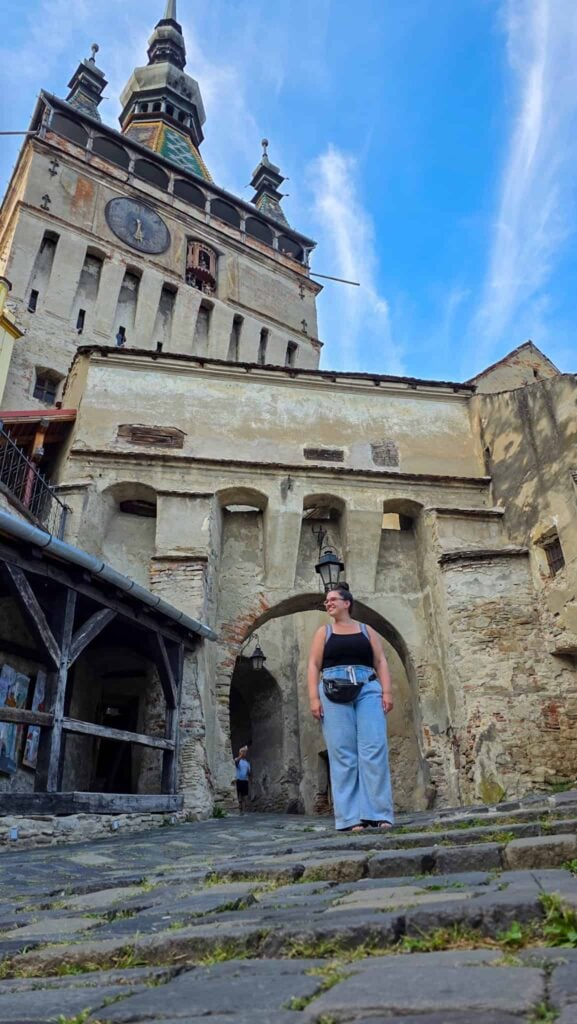
It was built at the end of the 13th century and it is the only tower in Sighisoara that was not built and maintained by guilds.
The other 13 towers in Sighisoara are all named after the guilds that owned them. For example, the Tailors’ Tower or the Tanners’ Tower.
The tower has 2 clock mechanisms, one facing the old town and one facing the exit. Each side has different figurines.
On the side facing the citadel you’ll see the Goddess of Peace, a drummer that hits a bronze drum when the clock hits 6am or 6pm, Justice and Righteousness, and two angels representing day and night.
On the side facing the exit from the citadel you’ll see another drummer and a figurine on a rotating platform. There are 7 figurines on the rotating platform, one for every day of the week. These 7 figurines also depict the seven ancient gods, seven planets and seven basic metals.
If you pay the equivalent of 5 euros you can also climb up the Clock Tower to get an incredible panoramic view of the city.
Birthplace of Dracula
If you continue walking straight after the Clock Tower you will find a yellow house that was the birthplace of Dracula. It has a plaque that says this, so you can take a picture with it.
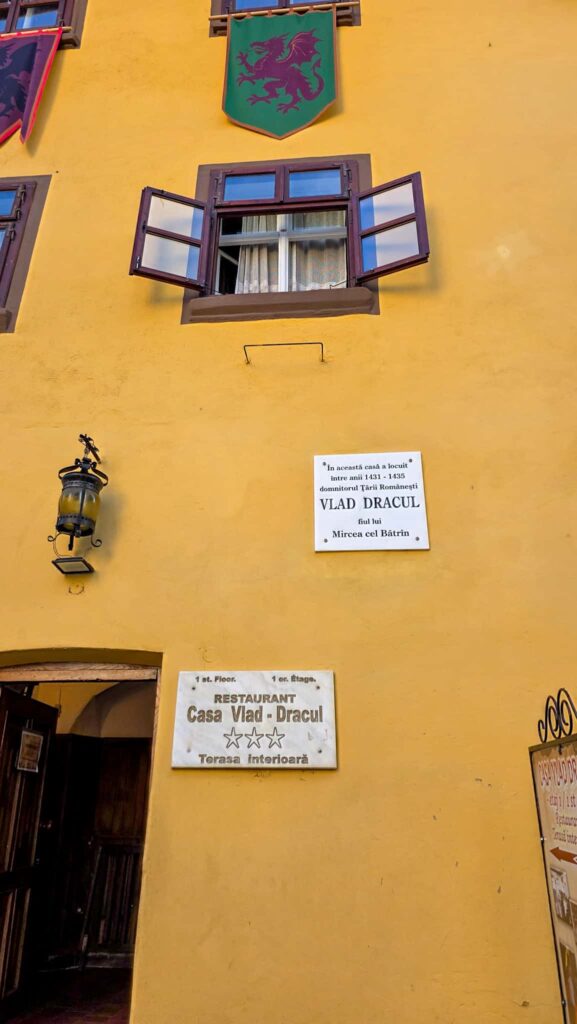
There is an indoor museum called Dracula’s Room, but I don’t recommend it. It’s just some vampire decor and one person trying to scare you as you enter the room. It’s not worth it.
Stroll through the cobblestone streets
My favorite thing to do in medieval citadels is to do a self-guided walking tour. That’s because I love to explore every corner of the town and get lost through the cobblestone streets.
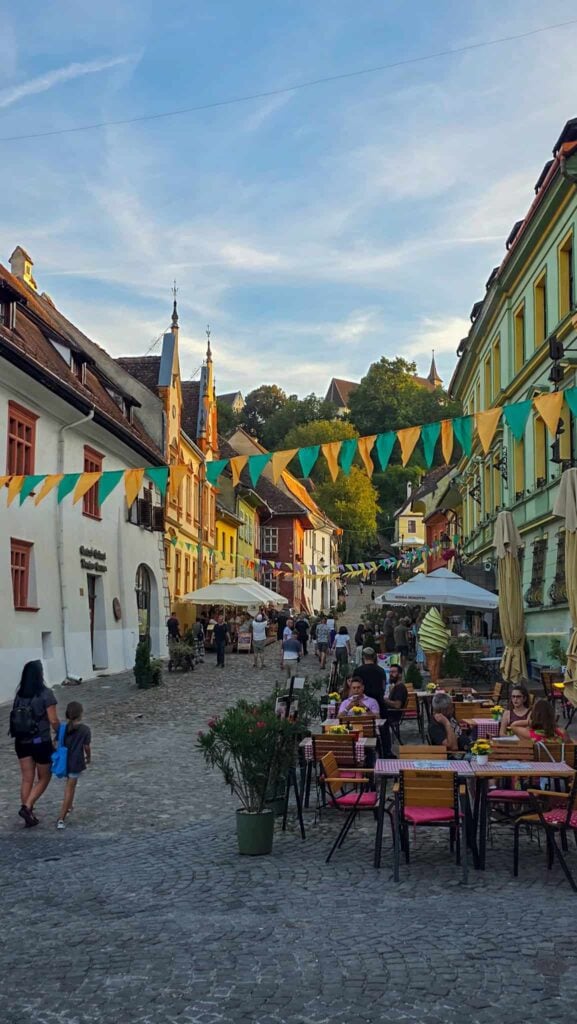
There are plenty of bars, cafes, and restaurants in Sighisoara if you want to do some people watching or need a break. You can also find some souvenir shops to get a little gift for you and your loved ones.
Make sure you spend some time in the Citadel Square (or Piata Cetatii in Romanian). It has incredible pastel colored houses, shops, restaurants, and a great view of the Clock Tower. You feel like you stepped back in time.
Covered staircase
At the other end of the citadel you’ll find the covered staircase. It’s exactly what its name suggests. A wooden staircase built during the medieval times that has 174 stairs that connects the lower and upper parts of the city.
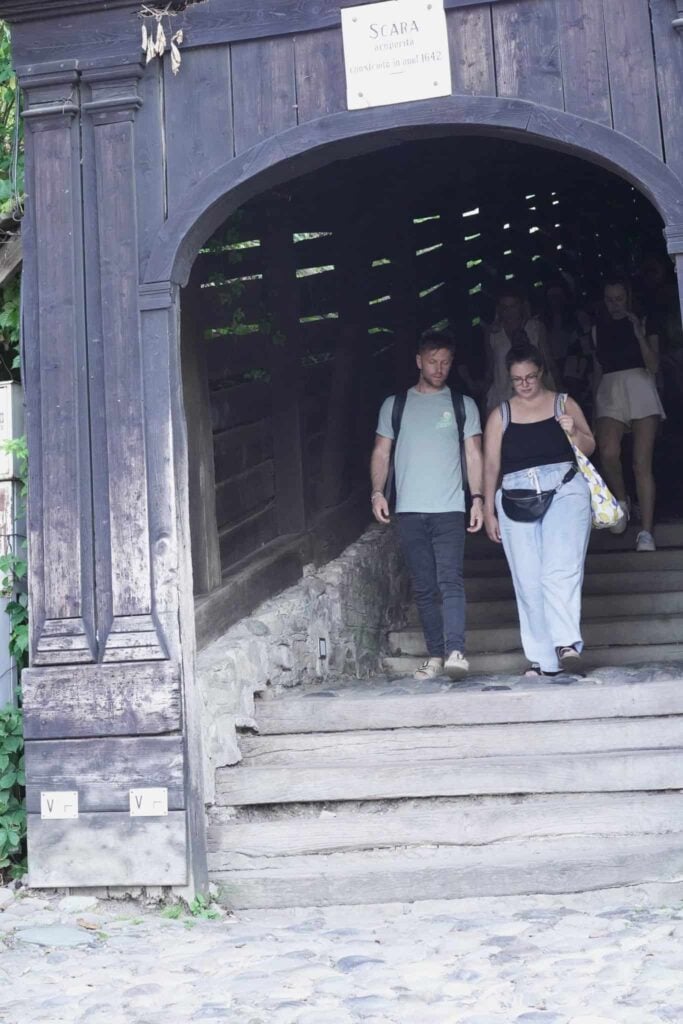
At the beginning and end of the staircase you’ll find live musicians playing guitars, so it’s a very nice ambiance.
The Church on the Hill
Once you climb the covered staircase you’ll find the Church on the Hill. This is the third largest church in Transylvania and the most important church in Sighisoara.
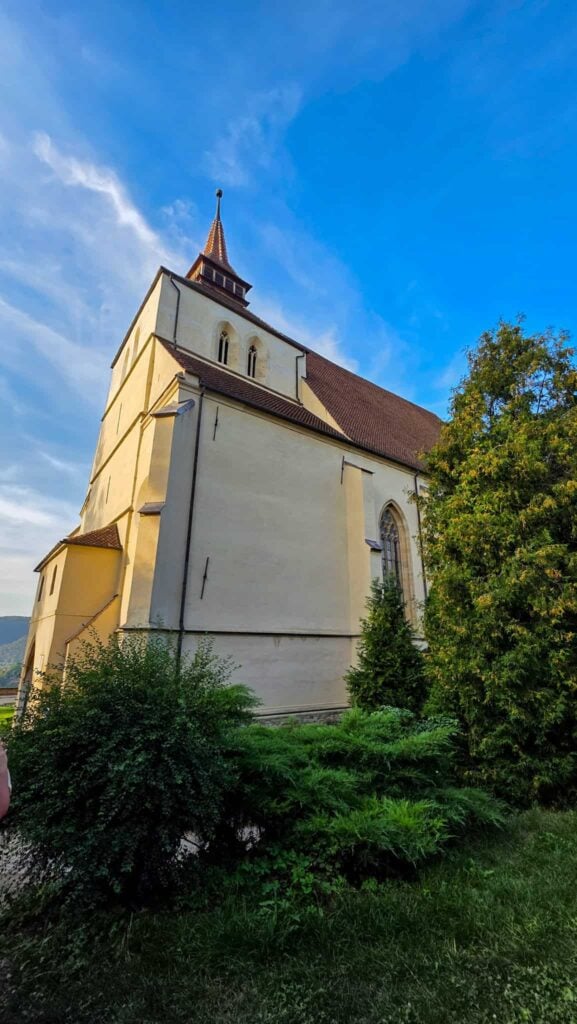
Next to the church you can find a great observation deck where you can enjoy a nice view of the city. It’s also a great place for pictures, especially during sunset.
Saxon Cemetery
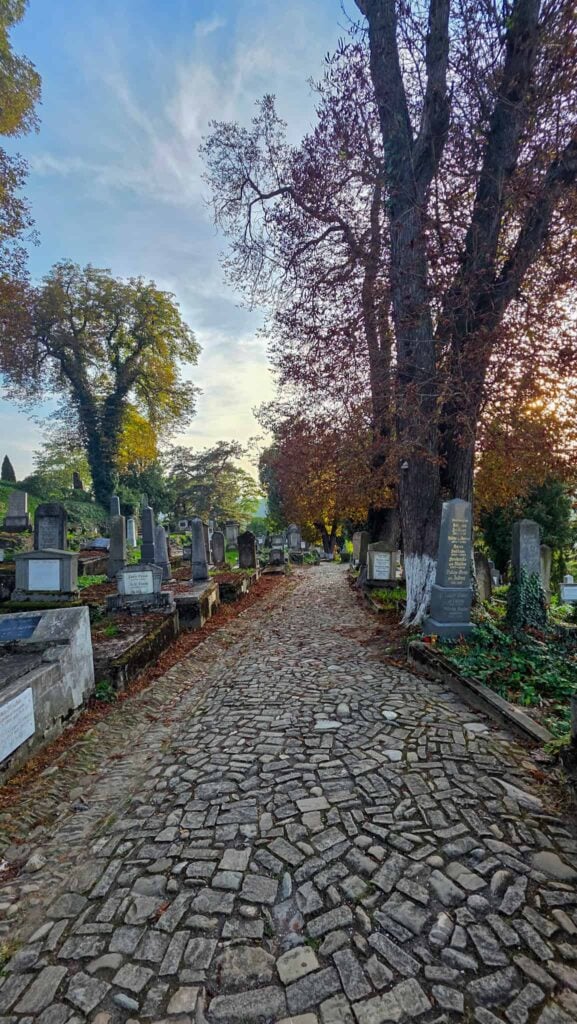
Right by the church there is a Saxon cemetery where some of the most important figures of Saxon descent are buried. It’s open to visitors so you can take a quick stroll through it.
Eat at Hotel Sighisoara Restaurant
There are plenty of good restaurants in Sighisoara. I ate at the restaurant of Hotel Sighisoara and the food was very good. They have seating outside, inside, and they also have a courtyard inside if you want to be outside, but have more privacy.
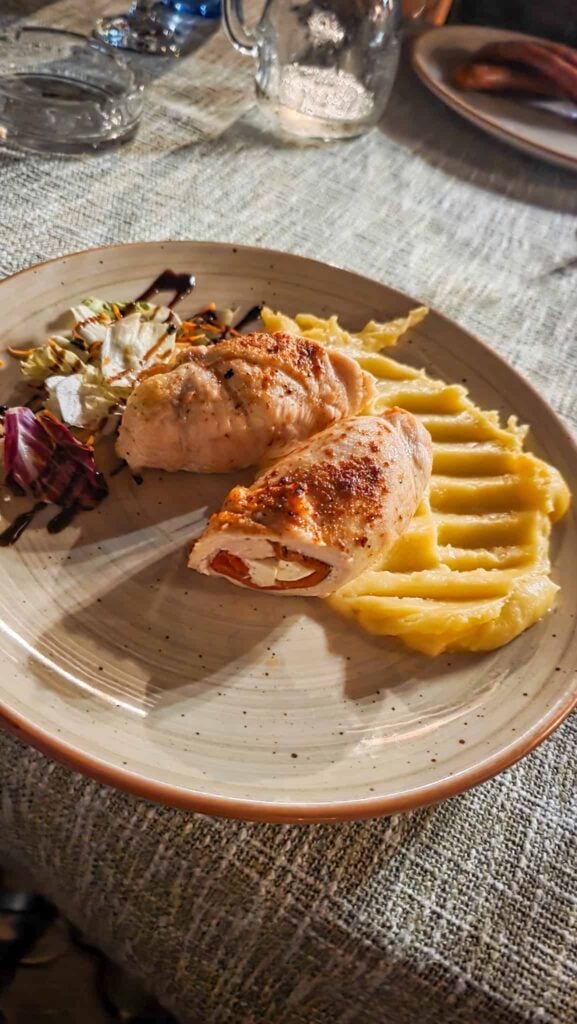
I had the chicken breast stuffed with telemea (the Romanian feta cheese) and baked peppers, mashed potatoes, and pickles. It was delicious, so I highly recommend it.
Tips for visiting Transylvania
What is the best way to visit: by car or by train/bus?
I think a Transylvania road trip using a car rental is the best choice. That’s because you’ll be able to enjoy the scenic drives, explore at your own pace, and not have to worry about navigating the Romanian public transport system.
When is the best time to visit Transylvania?
All seasons are great, but it depends what types of activities you’re looking for.
Spring and summer are great if you want to prioritize exploring the outdoors. Fall is perfect if you want to also see the leaves changing color. And winter is a good choice if you want to see the Christmas markets, ski, snowboard, and even stay at an ice hotel at Balea Lake.
Where should I stay in Transylvania?
In Brasov I recommend you stay at Radisson Blu Aurum Hotel since it’s located in the Old Town and it’s close to most attractions. It’s a 5-star hotel and it also has a rooftop pool.
In Sighisoara I recommend you stay at Pensiunea Sonnenhoff. It’s about a 5-10 minute drive from the city, but the location is a dream. You’ll be in the vineyards and have the most incredible views for sunrise and sunset.
Do I need cash for my Transylvania visit?
Yes, it’s a good idea to have some cash with you. Most places accept credit cards, but if you need to buy something from a village or you want to tip a tour guide then it’s better to have cash.
Is 4 days enough in Transylvania?
No. On a 4-day tour you’re barely scratching the surface of what Transylvania has to offer. I recommend you spend at least one week here.
Besides the places on this 4 day itinerary you should also visit:
- Sibiu: the medieval city with houses that look like they have eyes
- Drive on the Transfagarasan Road: one of the most spectacular roads in the world
- Visit Balea Lake: a glacier lake at the end of Transfagarasan
- Hike in the Carpathian Mountains and see The Sphynx
✈️ Heading to Romania soon? Check out these guides:
- Where to stay in Brasov: the best hotel guide
- Where to stay in Sighisoara: the best hotels
- The best area to stay in Bucharest
- Bear watching in Transylvania: all you need to know
- Romania in 5 days: a native’s ultimate itinerary
- The best Romania one week itinerary from a local
- The best Oradea 3 day itinerary: a native’s top picks
Need inspiration for your next trip? Check out some of my other articles.
Debunking myths about Romania: a native’s perspective
Romania in 5 days: a native’s ultimate itinerary
Is Romania safe for solo female travelers in 2025?
The ultimate Romania road trip designed by a native
Ultimate list of unique places to stay in Romania
The best Oradea 3 day itinerary: a native’s top picks
Top 8 reasons why you should visit Oradea, Romania
Paris solo travel: everything you need to know
Andorra itinerary: everything you need to visit
Warsaw itinerary: ultimate guide for your first visit
Barcelona 3 day itinerary: the best things to do
Doha itinerary: the best guide for your first visit
Tallinn in 2 days: everything you need to know
Beginner’s guide to NYC: everything you need to know
The best guide for solo travel to Amsterdam
Solo female travel to London: the ultimate guide
The best Oradea 3 day itinerary: a native’s top picks
Istanbul solo travel guide: is Istanbul safe for women?
Helsinki in 2 days: everything you need to visit
Solo travel in Vienna: how to have the best trip
Florence 4 day itinerary: the best guide for solo travelers
Athens 4 day itinerary: ultimate guide for your first visit
4 Day Dublin itinerary: everything you need to know
Solo travel in Milan: the best things to do
Solo travel to Toronto: the ultimate 2 day itinerary

Ioana was born and raised in Romania, lived in NYC for 14 years, and has since returned to Romania. She began traveling solo at 30 and has now visited 25+ countries. Ioana is a full time travel blogger and content creator. Her blog gets 100K+ views per month and her Instagram community has 80K+ people. She loves to share practical travel tips, itineraries, and recommendations for fellow travelers. Her story and insights have been featured in The Daily Express, Euronews, Bored Panda, Yahoo, MSN and more.
